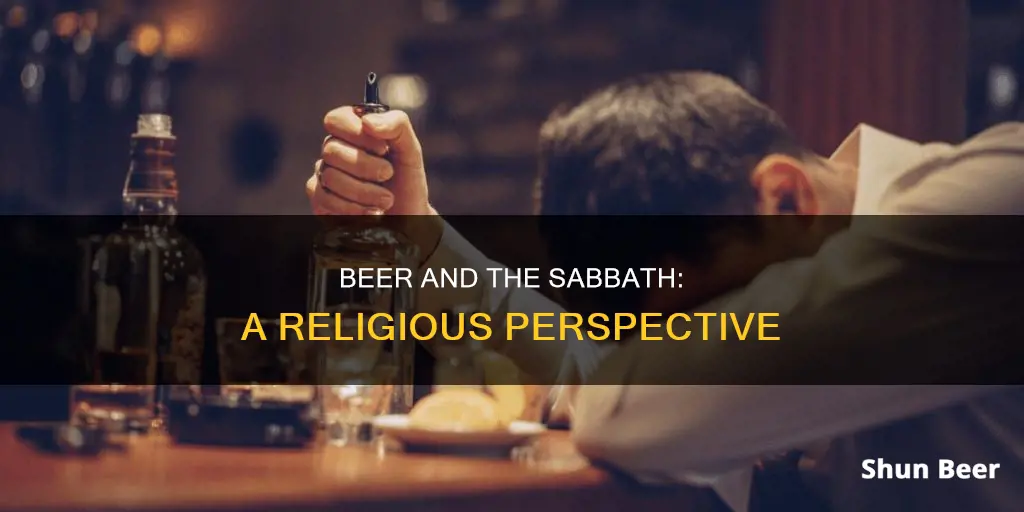
Drinking alcohol on the Sabbath is a topic that has been discussed and debated by various religious groups. While some religions strictly prohibit alcohol consumption, considering it harmful to spiritual and physical well-being, others incorporate it into their rituals and ceremonies. For example, in Judaism, wine holds a significant place in religious rituals and celebrations, and it is used during the Sabbath as part of the Kiddush blessing. However, Jewish teachings also promote moderation and temperance, discouraging excessive drinking. On the other hand, in Christianity, there are differing attitudes towards alcohol, with some denominations advocating for moderation while others promote abstinence.
| Characteristics | Values |
|---|---|
| Is drinking beer on the Sabbath allowed? | Depends on the religion and its specific denomination |
| In Judaism, drinking wine is allowed and is one of the two commandments associated with the Sabbath. However, excessive consumption and drunkenness are discouraged. | |
| In Christianity, some denominations advocate for abstentionism or prohibitionism, while others allow moderate consumption. | |
| In Islam, the consumption of alcohol is prohibited. | |
| In Hinduism, religious texts generally discourage the use or consumption of alcohol, but some texts refer to alcohol with a more positive opinion. | |
| In Buddhism, observant Buddhists typically avoid consuming alcohol as it violates the 5th of the Five Precepts. |
What You'll Learn

Drinking alcohol on the Sabbath is allowed in some religions
In Judaism, for example, drinking wine is one of two commandments associated with the Sabbath, with the minimum amount required for Kiddush being 3.07 ounces. However, drinking more than this amount is also welcome. Wine is used during the Sabbath and festival meals as part of the Kiddush blessing, which sanctifies the day and acknowledges the sanctity of the occasion.
In Christianity, the use of sacramental wine in religious rites such as the Eucharist is common, with some denominations advocating for moderation while others promote abstinence. The Plymouth Brethren, for instance, teach that the wine used in the sacrament is symbolic of the blood of Christ.
In Hinduism, the consumption of alcohol is generally discouraged, with religious texts such as the Vedas and Upanishads considering intoxication as a recipe for weakness and violent behaviour. However, Smriti texts, which are considered less authoritative, encourage the use of alcohol while reminding that abstention is better.
While some religions strictly prohibit alcohol consumption, viewing it as harmful to spiritual and physical well-being, others incorporate it into their rituals and ceremonies. For example, in Shinto purification rituals, sake is consumed as Omiki, and in Taoist rituals, alcohol is offered to ancestors and used to connect with the divine.
It is important to note that even within the same religion, attitudes towards alcohol consumption on the Sabbath can vary due to cultural context, personal beliefs, and degrees of religiosity.
Champagne and Beer: Mixing Drinks, Safe or Not?
You may want to see also

Beer was a staple in the Israelite diet
The production of beer was closely linked with that of bread, as barley was the key ingredient in both. In ancient Israel, men, women, and even children of all social classes drank beer. People who were sad were advised to drink beer to temporarily forget their troubles. However, the biblical authors also called for moderation, with several passages condemning those who consumed too much beer.
The process for making beer in ancient Israel was different from that of today. Beer was often produced by creating a bread or cake made from malted barley or wheat. The bread was then placed in water, forming a sweet liquid known as wort. After a few days, yeast was added, and the carbohydrates were converted to alcohol and carbon dioxide, causing the liquid to bubble and ferment. Beer did not keep well, so it was made for immediate consumption.
The Hebrew word "shekhar" is often translated as "strong drink" in English Bibles, but it is believed by some scholars to refer specifically to beer. The importance of beer in ancient Israel can be seen by the fact that, over time, the word for beer became synonymous with drunkenness in several languages of the region.
Beer was also intimately linked with religion in ancient Israel. For example, the Bible states that Noah drank wine and became drunk, and this incident has been used to argue for the existence of alcoholic drinks in biblical times. Additionally, the Bible mentions the importance of wine and oil, which were used in Jewish rituals and ceremonies, and these were also key ingredients in the production of beer.
While wine was also consumed in ancient Israel, the widespread cultivation of grapes, used primarily for winemaking, indicates that wine drinking was probably far more common than beer drinking. However, beer was a staple in the Israelite diet and played an important role in their daily lives and religious practices.
Drinking Beer While on Macrobid: What You Need to Know
You may want to see also

Alcohol is used in religious ceremonies
Alcohol has been used in religious ceremonies and rituals throughout history, with its role varying across different faiths and traditions. While some religions strictly prohibit alcohol consumption, considering it harmful to spiritual and physical well-being, others incorporate it into their sacred practices. Here are some examples of how alcohol is used in religious ceremonies:
Christianity
In Christianity, red wine holds symbolic significance as a representation of the blood of Christ during holy communion. The use of sacramental wine in religious rites, such as the Eucharist, is a longstanding tradition within the faith. While some Christian denominations advocate for abstinence or moderation, others have a more relaxed approach, viewing alcohol as a gift from God that brings joy to life.
Judaism
Wine plays a significant role in Jewish rituals and celebrations. During the Sabbath (Shabbat), the kiddush ceremony involves blessing Kosher wine and challah bread. Participants toast by saying "l'chayim," meaning "to life." Wine is also integral to the Passover Seder, where families bless and drink four cups of wine, symbolising the four expressions of redemption mentioned in the Torah.
Shinto
The Japanese Shinto religion reveres sake as the "liquor of the gods." Sake is offered to deities at shrines and is an essential part of agricultural rites, such as the jichinsai ground purification ritual. Shinto followers believe that drinking sake is associated with a bountiful harvest, as the god of sake is also the god of rice and the harvest.
Buddhism
While Buddhists generally abstain from alcohol, believing it hinders their path to enlightenment, some Buddhists practice "mindful drinking." They view alcohol as a tool to relax the ego and enhance focus rather than an escape. Additionally, in Tibetan Buddhism, the kapala, a sacred cup made from a human skull, is filled with alcoholic beverages as an offering to wrathful deities.
Hinduism
Hinduism does not strictly forbid alcohol consumption but encourages individuals to consider how it aligns with their personal religious goals and karmic actions. Some monks take vows of abstinence, while Tantric groups use alcohol in sacred ways, offering it to deities or as medicine in the ancient Hindu healing system of Ayurveda.
These examples demonstrate the diverse ways in which alcohol is incorporated into religious ceremonies and rituals across different faiths. The use of alcohol in these contexts often holds symbolic and spiritual significance, contributing to the depth and richness of these religious traditions.
Beer and Knee Pain: Is There a Link?
You may want to see also

Alcohol consumption is discouraged by some religions
In Christianity, attitudes vary. Some Protestant denominations, like Methodists and Evangelicals, promote abstentionism or prohibitionism, with a history of leadership in the temperance movement. Other Christian groups, like Lutherans, Catholics, and Anglicans, are the largest adherents of moderationism, the most common position worldwide. While the Bible acknowledges the symbolic significance of wine in Christian theology, it also warns against drunkenness.
Judaism also embraces a moderate and responsible approach to alcohol. Wine is integral to sacred rituals and social gatherings, like the Sabbath, Passover Seder, and weddings. However, Jewish teachings promote temperance, and excessive drinking is discouraged.
Hinduism lacks a central authority, but religious texts generally discourage alcohol consumption, especially for Brahmins due to their spiritual responsibilities. However, Smriti texts offer conflicting views, with some encouraging alcohol use.
Overall, the relationship between religion and alcohol is complex, reflecting the diverse cultural, social, and religious practices of different faiths.
Beer and Zyrtec: What You Should Know
You may want to see also

Alcohol is viewed differently across various Christian denominations
The use of sacramental wine in religious rites, such as the Eucharist, underscores its symbolic significance within Christian theology. The Catholic, Orthodox, Lutheran, and Assyrian traditions teach the real presence of Christ in the Eucharist. In Lutheran theology, the blood of Christ is in, with, and under the sacramental wine. The Plymouth Brethren teach that the wine is a symbol of Christ's blood. According to the Catholic Church, the sacramental wine used in the Eucharist must contain alcohol.
Some Christian denominations, such as the Methodist tradition, require the use of "pure, unfermented juice of the grape" in the sacrament of Holy Communion. Many Protestant churches, particularly Methodists and other Evangelical groups, advocate for abstentionism and prohibitionism, playing a leading role in the temperance movement of the 19th and 20th centuries.
On the other hand, certain monastic communities, like Trappists, have brewed beer and made wine. The most common position among Christians is moderationism, held by the largest bodies of Christians, including Lutheranism, Roman Catholicism, Eastern Orthodoxy, and Anglicanism.
The Bible has several references to alcohol consumption, with varying interpretations. While some passages seem to advocate for moderation, others suggest negative consequences of excessive drinking. For example, the Book of Proverbs states, "Wine is a mocker, strong drink is a brawler, and whoever is led astray by it is not wise" (Proverbs 20:1). In contrast, Deuteronomy mentions God's promise to bless His followers with an abundance of "new wine" (Deuteronomy 7:12-13).
The interpretation of these biblical passages and the role of alcohol in religious rites contribute to the varying views on alcohol consumption among Christian denominations.
Beer and Work: Can Companies Ban Alcohol?
You may want to see also
Frequently asked questions
It is not a sin to drink beer on the Sabbath in Judaism. In fact, drinking wine is one of just two commandments associated with the Sabbath. However, excessive consumption and drunkenness are discouraged.
Drinking wine is meant to fulfill the "remember" part of the Sabbath. According to the medieval philosopher Maimonides, it is a way of creating a sense-memory by associating the metaphysical act of sanctifying the day with a positive physical taste and the mental sensation of being buzzed.
The Bible acknowledges both the positive and negative aspects of alcohol. While it is valued as a sacrificial offering and a form of medicine, it also warns against drunkenness and over-indulgence.
The world's religions have varying relationships with alcohol. While some incorporate it into their rituals and ceremonies, others strictly prohibit it, viewing it as harmful to spiritual and physical well-being. For example, Islam, Buddhism, and Baháʼí Faith forbid the consumption of alcohol.







